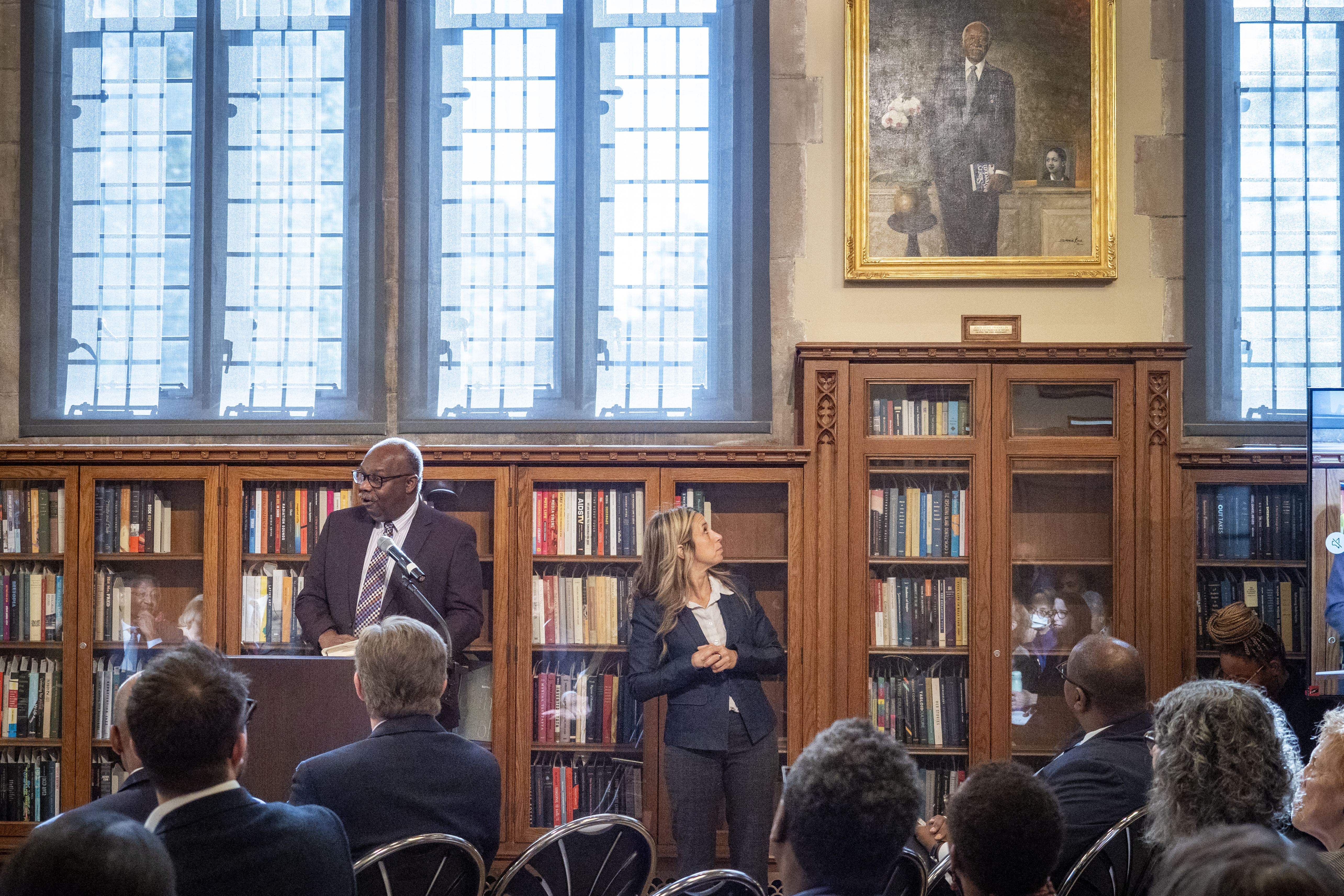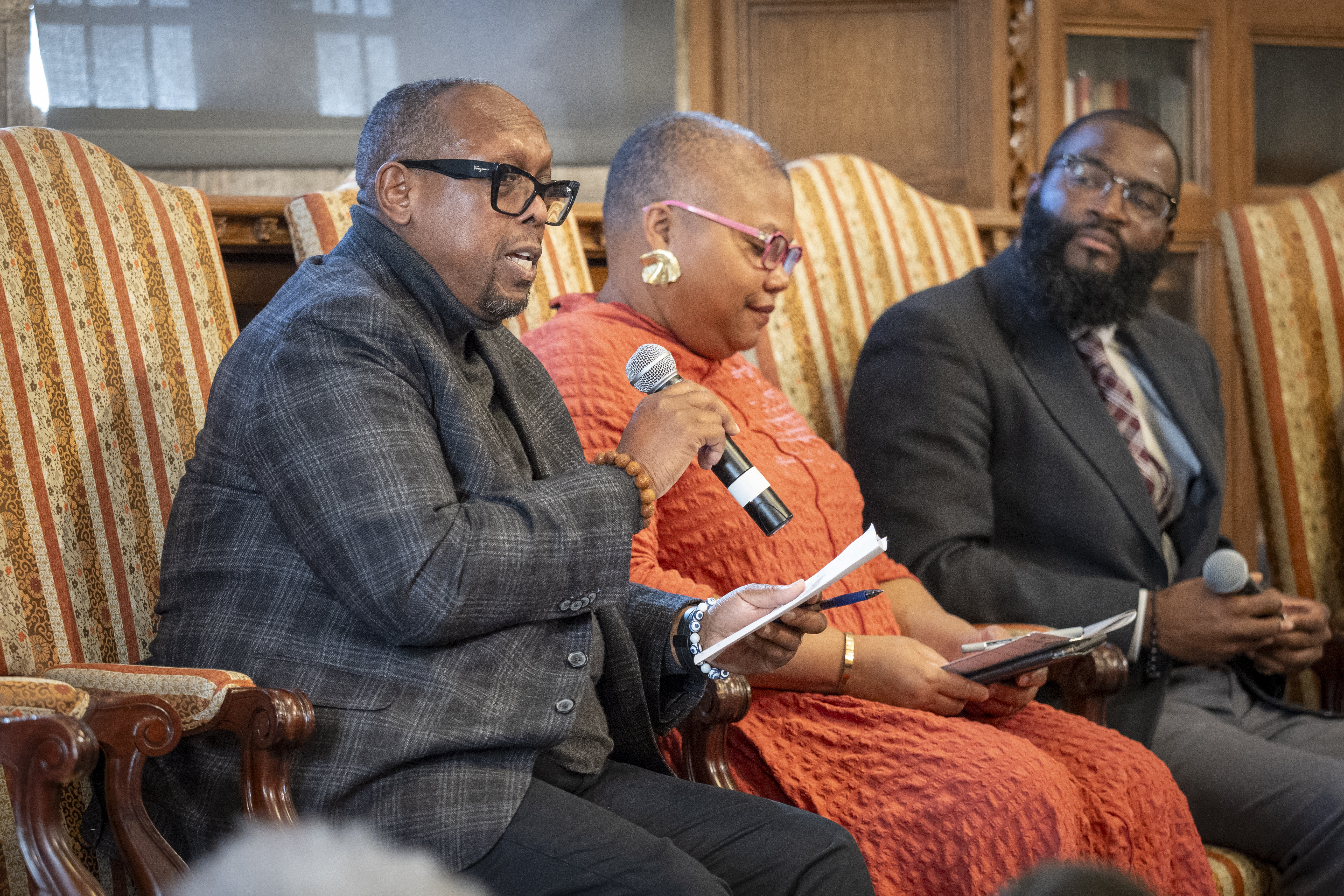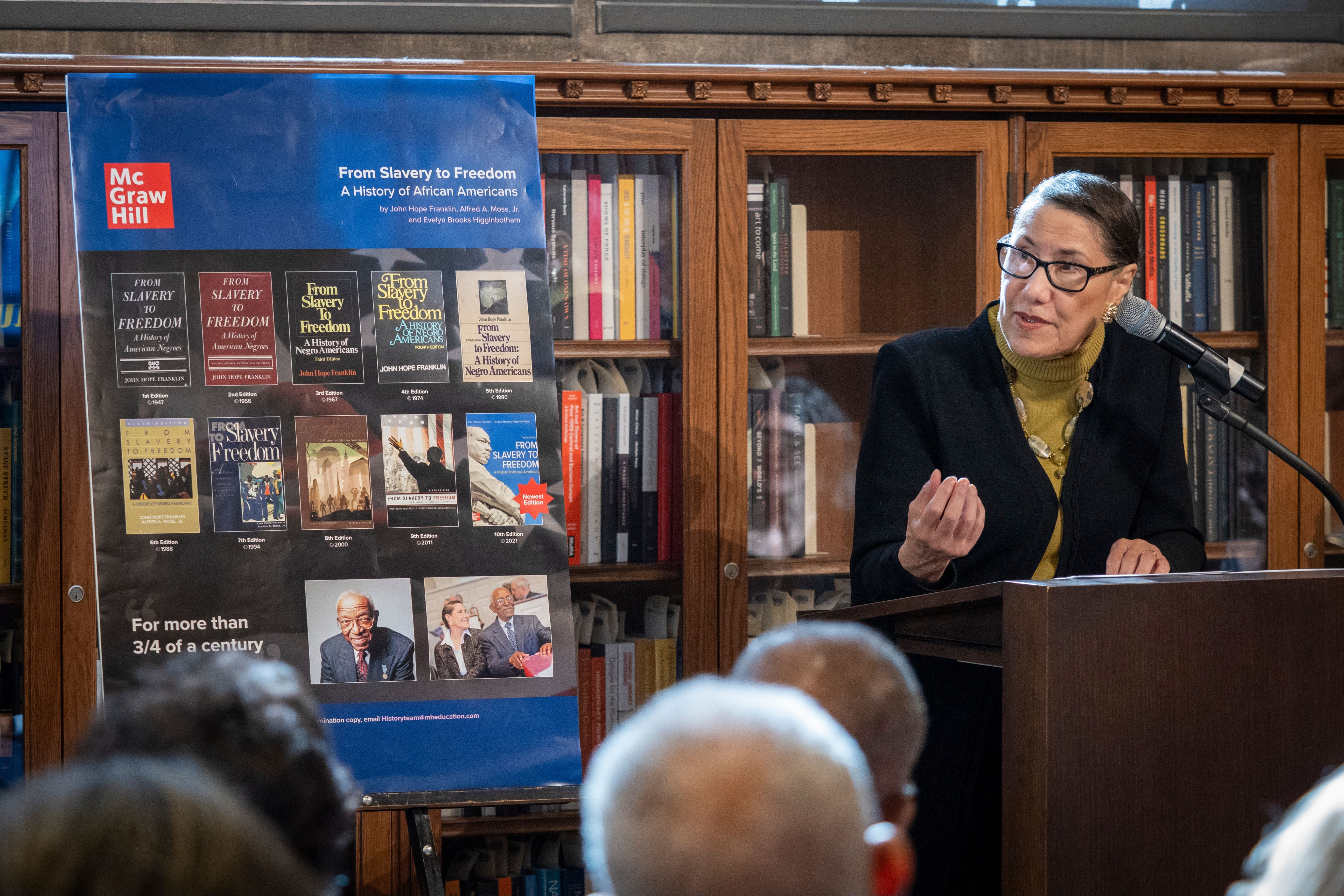From Slavery to Freedom Symposium
Why historian John Hope Franklin’s work remains essential today
“What an incredible experience that was,” Johnson said. “He talked about his relationship to this institution and how important it was for him as a young scholar to be able to be here, and the challenges in the 1940s in doing research as a Black scholar but being able to come back to North Carolina College as it was known at that time to an environment where he was welcomed and accepted.”
I knew him from a human perspective. I didn’t realize how accomplished he was. I just knew him as a neighbor.
Joyce Cordelia Page
Joyce Cordelia Page, who attended the two-day event held on successive days at NCCU and Duke University, was a child in the 1940s when her parents lived next door to the Franklins. Her parents operated a small, whitewashed grocery store across the street from the two-story apartment building.
“He was a very nice man, a wonderful person, and a kind person,” Page said. “He would visit my grandmother and always sent her pictures of his son. My grandmother would put the pictures on her coffee table under glass. That’s how we knew him,” she added.
“I knew him from a human perspective. I didn’t realize how accomplished he was. I just knew him as a neighbor. I didn’t realize the national impact he had, which was typical. We were so unique in Durham. Famous Black people spent more time in their communities because they didn’t have many options.”
The second day of the symposium, “From Slavery to Freedom: From Durham To The World,” took place at the Gothic Reading Room in Duke’s Rubenstein Library.

Adriane Lentz-Smith, associate professor of history at Duke, noted that institutions played important roles in Franklin’s career.
Franklin’s life at N.C. Central was “formative,” Lentz-Smith said. “It came early in his career, and was one of his first academic appointments. Duke came at the end of an incredibly illustrious career where Dr. Franklin was the first of many things. It’s a nice way to celebrate him…with the bookends that marked sort of who he was as a scholar over a long career, and also to acknowledge how important a figure he is in Duke's institutional history in North Carolina, Central's institutional history, and really as one of the many intellectual lights who have made Durham kind of the heart of black intellectual vitality in the Upper South.”

Seated: Nell Irvin Painter (Princeton), Jasmine Nichole Cobb (Duke), Crystal Sanders (Emory)
Speaking: Tracey Burns (NC Dept of Natural and Cultural Resources)
Not shown: Tiffany Willoughby-Herard (University of California, Irvine)
Johnson, Page and Lentz-Smith were among the nearly 300 historians, students, activists and others from across the United States gathered on the two Durham campuses — with an additional 300 in attendance virtually — to celebrate “From Slavery to Freedom,” Franklin’s best-known book, according to a Rubenstein Library exhibit spotlighting the work.
“The completed manuscript was over five hundred pages and was released to rave reviews but only moderate sales,” according to the exhibit. “However, the book gained substantial attention with the emergence of Black Studies as an academic field in the late 1960s and 1970s.”
Franklin was in his early 30s, when he completed “From Slavery to Freedom.” He was among a cadre of Jim Crow-era historians who wanted to correct the myths, errors, stereotypes and omissions that littered the mainstream historical perspective on Black American life. The work encouraged other historians to address the impact the Black struggle for freedom has had on advancing American progress.
Johnson said “From Slavery to Freedom” is “the preeminent volume on the Black experience in the United States.”
“And here you have John Hope Franklin, who had the wisdom to start our history not enslaved, not in slavery, but on the continent of Africa,” Johnson said, “and to remind us that the experience of enslavement was but an episode in a very long and proud history of our people.”
The book, Johnson added, “opened the eyes of so many Americans, African Americans, our friends in the white community as well.”

Crystal R. Sanders, Professor of African American Studies at Emory University 
Carlton Wilson, Dean, College of Arts, Social Sciences and Humanities at North Carolina Central University 
Joseph Salem, Rita DiGiallonardo Holloway University Librarian and Vice Provost for Library Affairs at Duke University
Franklin’s work resonated deeply across the anatomy of America’s racial landscape and internationally. Now in its tenth edition, the work has been translated into Japanese, Portuguese, French and German.
Mark Anthony Neal, James B. Duke Distinguished Professor of African and African American Studies, called Franklin the dean of African American history, and said “From Slavery to Freedom” was his “grand intellectual work,” that helped introduce Neal to African American history.
I think the fact that the book has had this longevity speaks a great deal about its importance to not just African-American life, but American life.
Mark Anthony Neal

Franklin’s body of work as a very public historian continues to reverberate today.

The centerpiece of the two-day symposium was a series of panel discussions that explored Durham, Duke, NCCU and scholarship in the Jim Crow South; New Black Histories that build on the foundation of “From Slavery to Freedom,” Black women histories, the book’s impact in public histories, and Franklin’s international legacy.
Evelyn Brooks Higginbotham, the Harvard historian who has co-authored and contributed to editions of “From Slavery to Freedom” since 2004, delivered a riveting keynote address during the second day of the symposium. Higginbotham said by the early 2000s, Franklin collaborated with historian Alfred Moss Jr. because Franklin understood that for the 40th anniversary edition, he needed a younger co-author, “whose different perspectives and ample energies would assist in giving the new edition the freshness and energies that it requires and deserved.”
Higginbotham also noted that Franklin lived long enough to see the election of the nation’s first Black president.
“In fact, John Hope Franklin rode around with Barack Obama trying to get him elected in North Carolina, which was no small thing. But North Carolina came through,” she said.
“I’ll tell you one thing that all of us know, without a doubt: that we stand on the shoulders of generations of scholars before us. People who pondered the dangers and the racial obstacles of their time, just as we are encountering the problems of our time,” Higginbotham said.
“As we face the conundrums, and the complexities, the dangers and difficulties to our nation, and our world today; there is no shoulder more sturdy, more steady to stand on with hope, and with faith than John Hope Franklin and the legacy he left us, ‘From Slavery to Freedom.’”
